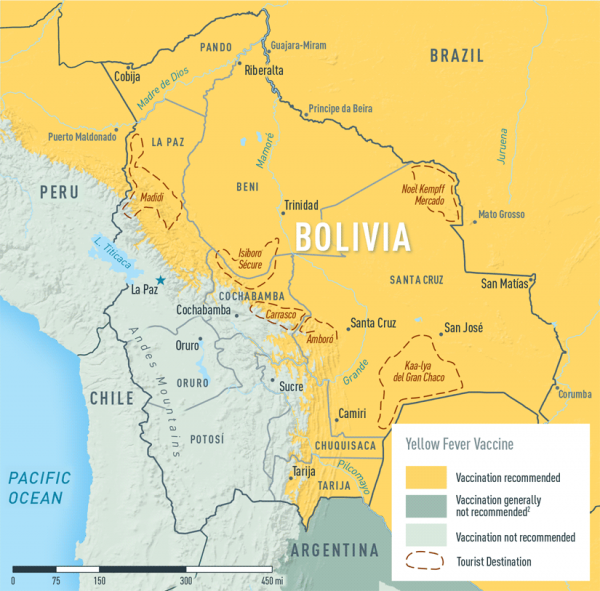Bolivia is famous for its salt flats and varied terrain spanning over the Andes Mountains, the Atacama Desert and Amazon Basin rainforest. Located in South America, the climate varies drastically from one eco-region to the other. Travelling around Bolivia you’ll experience different climatic extremes, such as humid tropical climates to subtropical climates to desert-polar climates. It is important to seek travel advice before travelling as medical advice can vary dependent on the area/s you plan to visit.
Our general advice includes:
Vaccines
Routine immunisations are a high priority; it is good to check that they are all up-to-date before travelling anywhere. Given the current worldwide outbreaks, we strongly recommend checking your immunity status to measles. A simple immunity test can confirm all those who are unable to source vaccine proof. The best protection against measles is having 2 doses of a measles-containing vaccination, such as the MMR.
Travel vaccinations for Bolivia vary depending on where you plan to travel, and what you plan to do. It is best to book a consultation with a travel nurse to discuss your upcoming adventure. They will assess what risks you will potentially be exposed to. From this, they can develop a bespoke treatment plan specifically for your holiday.
As a minimum, travellers should be protected against Hepatitis A, and diphtheria, tetanus and polio. Certain travellers may consider vaccinations against typhoid, Rabies, Hepatitis B and Yellow Fever.
Yellow Fever
Yellow Fever is an unpleasant virus spread by the Aedes aegypti mosquito. This mosquito tends to bite during the day and is present in many lowland areas of South America and in all areas below 2,300m in Bolivia. Travellers who intend to visit the lowlands, such as the Chaco, Santa Cruz district and the Amazon may be advised to have the vaccine.

If your travel route includes other South American countries, you may also require the vaccination and an accompanying Yellow Fever Certificate in order to enter that country. The vaccination is not suitable for everybody. A careful risk assessment should be undertaken by a practitioner that specialises in the vaccine. Yellow Fever can only be given at designated Yellow Fever vaccination centres (YFVCs) – Fleet Street Clinic is a registered clinic.
Altitude
Bolivia is home to some of the highest peaks of the Andes mountains, with elevations of over 6,000m. The frequently visited cities of La Paz, Potosi and Uyuni all soar over 3,500m, making altitude sickness a real risk. The risk can be reduced by ensuring you stay hydrated, plan a slow ascent and factor in some acclimatisation days. Acetazolamide (Diamox) can be used to help aid the process. Book a pre-travel assessment and speak to a travel nurse about your options.
Insects
Mosquitoes, bugs and flies do more than just bite. They have the ability to transmit diseases that aren’t always preventable by vaccination or medication. Illnesses such as dengue fever, chikungunya, Zika, yellow fever, malaria and sleeping sickness are a few risks.
The best prevention is to entirely avoid mosquito bites. Cover up as much as possible and apply a minimum concentration of 50% DEET to any areas of exposed skin. Spraying your clothes with permethrin before travelling can provide extra protection. Sleep under a mosquito net, especially, if you plan to stay anywhere remote or rural.
See our Ultimate Bug Kit.
Malaria
Malaria occurs in the northern parts of Bolivia, in the Beni and Pando districts. Travellers heading to these areas should ensure they take anti-malarial medication. Mosquitoes that spread malaria are predominantly night-time biters. So, extra precautions should be taken between dusk and dawn. Any travellers who experience fever or flu-like symptoms on return from their trip should ensure they get tested for malaria, as unfortunately, no single prevention method is 100% effective.
First Aid
Whilst medical services and pharmacies are available in bigger cities, access to basic services is limited or even non-existent in the remote regions. Travel prepared and take a small medical kit that can treat basic complaints. Pack painkillers, antiseptic cream, plasters or dressing, and medication in case you suffer from an upset stomach. Head over to our online shop to purchase an essential first aid medical kit. This contains all your travelling medical essentials.
If you are prone to allergies, a non-drowsy antihistamine is helpful. Furthermore, if you take prescription medication, be sure to pack enough to last you for your entire trip.
Book your travel appointment today
By Anna Chapman | Travel Nurse | May 2019



